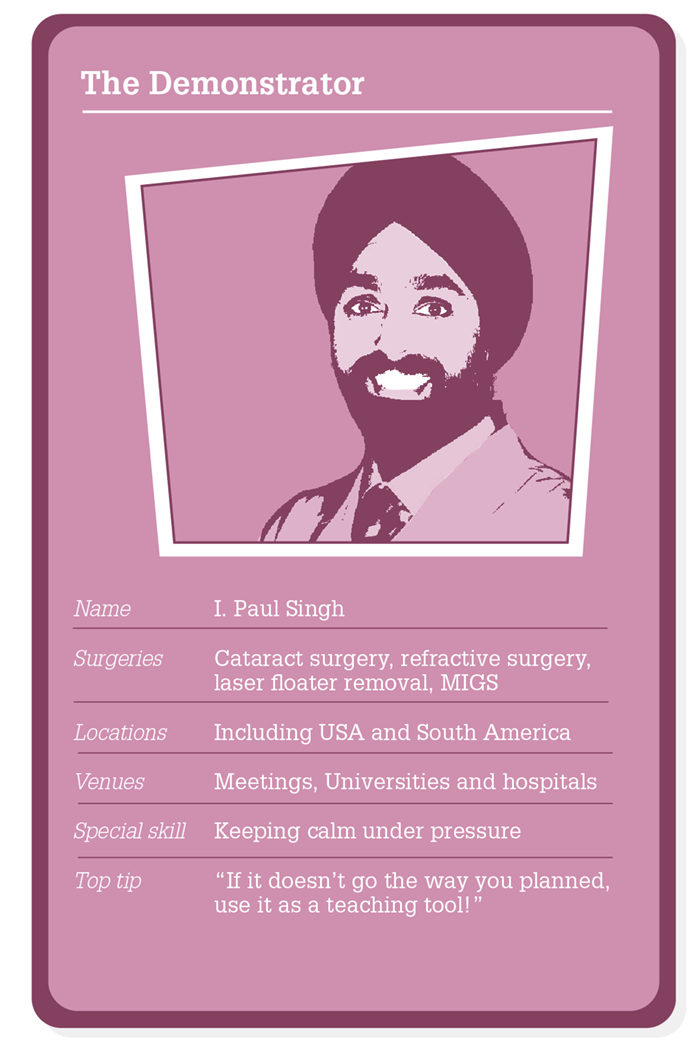
Most know me as an ophthalmic surgeon. But outside the clinic I play keyboard in a band, and the experience has really influenced my surgical skills. Not only has it helped me strengthen the ability of my non-dominant hand, it has helped me when it comes to performing live surgeries. Pretty much every surgeon, whether doing live events or presenting on the podium, gets a little nervous. Me too – I’m not immune to a bit of stage fright! Performing live on stage with my band and talking to the audience has definitely helped me learn that your approach is what matters.
Leading up to the event is the most nerve-wracking part. It will likely be on your mind the night before and in the morning when you wake up. Then you get to the operating room to find all the cameras and the production team; it can feel a little overwhelming. But if you’re feeling stressed, you just need to revert back to basics. You’re talking to your colleagues, and they are learning from you. Some of your surroundings might be unfamiliar – the microphone on your scrub and the camera in your face – but once you sit at the microscope or laser and get started, it isn’t any different to the thousands of cases you’ve performed before in your own office. It is just you and the patient, and you automatically revert back to your muscle memory. I find it is helpful to make your surroundings as familiar as you can, whether it is how you sit or the chair you use.
Expect the unexpected
You may have a version in your head of how you expected the surgery to go. But if it doesn’t go that way, don’t panic. If a complication does occur, just take a pause to re-evaluate. Those 10 seconds might feel like an hour in your mind, but they can help you stay calm and go back to the ‘basics’ of the procedure that you are trying to teach the audience. This brings to me a key piece of advice – be prepared to expect the unexpected. Surgery is surgery. No matter how much you plan, unexpected things can happen (See 'A series of unexpected events'). If things don’t go the way you planned, turn it into a teaching tool – tell the audience: “This is part of real surgery.” It’s important because the learning process for everybody is not just a perfect case! And that’s actually the beauty of live surgery – it’s unedited. A bit of a challenge is good because every surgeon encounters challenges – and it makes it more real for the audience. Just keep talking through what you are doing to overcome the challenge and it all adds to the learning experience for the audience. It also helps to remember that much of the time you’re teaching colleagues who haven’t had as much experience with the topic as you. So even if something doesn’t go the way you hoped, they’re not necessarily going to know the difference! I’ve made many mistakes when on stage with my band and thought “Oh no – I suck!” But the audience don’t really know what the song was supposed to be, or were focusing on the next part of the song. How you approach the performance – musical or surgical – is the important part. Keep smiling and keep going!One time, I was moderating a live femtosecond laser-assisted cataract surgery case – and the suction clip fell off. The surgeon and I looked at each other. There was nothing to do but start stalling. “Let’s talk about some of the different nuances of the laser,” I told the surgeon. And it turned out well because while he was re-docking the suction clip, we got to talk about the features of the laser. It wasn’t a big deal! You just have to take these things in your stride. Also, it shows how important it is for the moderator to think fast on their feet to minimize any impact to the event. On two separate occasions, I’ve been in South America to provide some teaching on laser floater removal. But arriving at the venue, I discovered my host had arranged live surgeries for me to perform as well. One included a patient who had a history of vitreous trauma – not the easiest case – and the host’s son who had a floater! Honestly, I was extremely nervous being confronted with these surprise live surgeries. But I just went with the flow and took my mind to being back in my own office. As soon as I sat down at the laser, muscle memory kicked in. The case where the patient had prior vitreous hemorrhage was tough but it went well; afterwards, the case host revealed he’d set that one up to test how good I really was…
